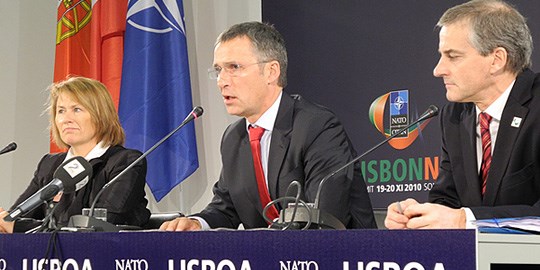New course for NATO
Historical archive
Published under: Stoltenberg's 2nd Government
Publisher: Office of the Prime Minister
Press release | No: 156/10 | Date: 20/11/2010
– Norway is satisfied with NATO’s new Strategic Concept. The Concept charts a new course in meeting the challenges of the 21st Century, said Prime Minister Jens Stoltenberg.
At the NATO Summit in Lisbon on 19 and 20 November, a number of important decisions were taken that chart the Alliance’s course for the next decade.

Prime Minister Jens Stoltenberg at a press conference at the NATO Summit in Lisbon, with Minister of Defence Grete Faremo (left) and Foreign Minister Jonas Gahr Støre. Photo: Office of the Prime Minister. More pictures here.
– Norway is satisfied with NATO’s new Strategic Concept. The Concept charts a new course in meeting the challenges of the 21st Century. It has been important to Norway to focus on collective defence as NATO’s main task. NATO’s partnerships, above all its relations with Russia, and NATO’s role in disarmament and non-proliferation has been other core issues for Norway, said Prime Minister Jens Stoltenberg.
– Our membership of NATO is a mainstay of Norwegian security policy. Therefore, the Government has considered it crucial to take an active part in formulating the Alliance’s new Strategic Concept. I am pleased with the balance that has been struck between NATO’s core role as a defence alliance and its operations outside the Euro-Atlantic area. This is something Norway has been working systematically towards for a number of years, said Mr Stoltenberg.
A key consideration for the Government has been the role of nuclear weapons in the Alliance. - The new Strategic Concept confirms that our common goal is a world free of nuclear weapons. This is a new and a positive development. We will continue our efforts to reduce the role of nuclear weapons in NATO after the summit, said Prime Minister Stoltenberg.
Another important decision made at the summit concerned the transfer of responsibility for security from the international forces to Afghan forces beginning in 2011. - It is positive that we can now begin the gradual handover of responsibility for security to the Afghan authorities. This will take time, but we will contribute to this effort. From 2011 we will continue to strengthen our efforts in training and capacity building and support the formation of Afghan security forces, said the Prime Minister.
Russia is NATO’s most important partner. The Lisbon Summit shows that these relations are good and are progressing well.
– NATO and Russia are facing many of the same security challenges. These challenges can best be addressed through cooperation, for example in the NATO–Russian Council. It is positive that President Medvedev participated in the Lisbon Summit. This is an indication of Russia’s desire to further develop the cooperation with NATO, said Mr Stoltenberg.
Agreement was reached at the summit on the progressive development of a territorial missile defence system in Europe. This system will build upon the alliance’ existing command- and control structure and will be a part of the collective defence under NATO command. – It is important that we are in general agreement that such a system should be developed in cooperation with Russia, said Prime Minister Stoltenberg.